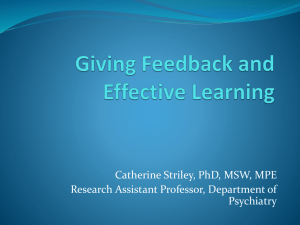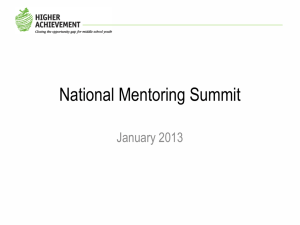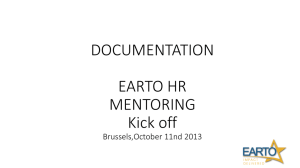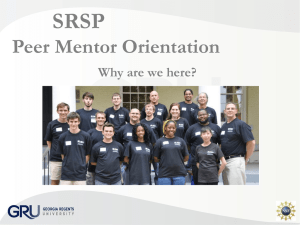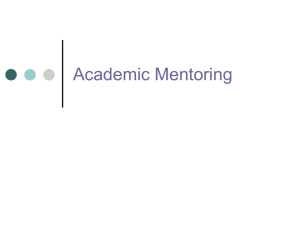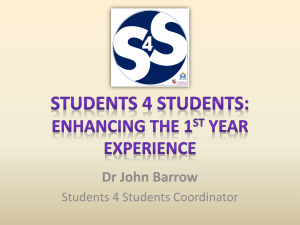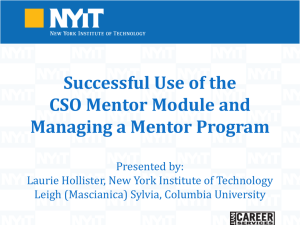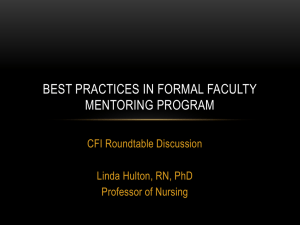Mentoring
advertisement
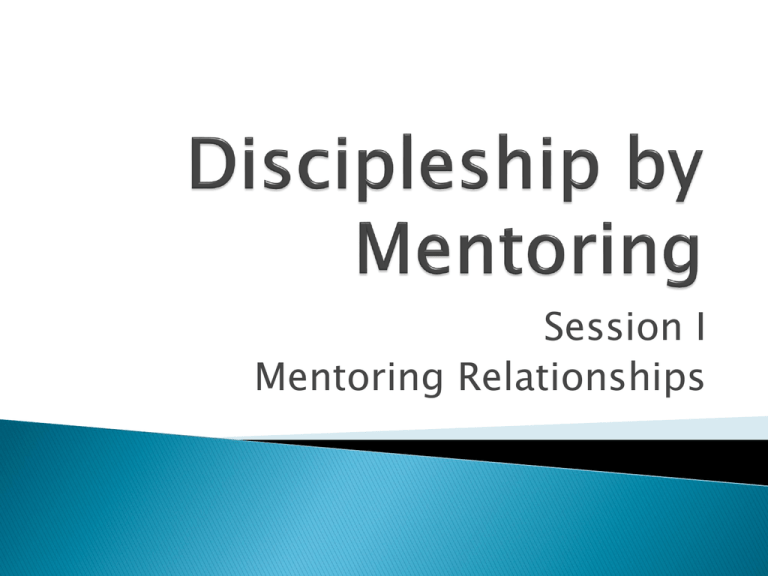
Session I Mentoring Relationships “It’s a willingness on the part of somebody who has a wealth of experience to share their knowledge, the stripes they’ve earned, with someone who doesn’t have as much experience - with no eye toward getting anything back. It’s about investing, giving back” -Jeff Mentoring is “Walking with another person to help them learn what it means to abide in Christ - to totally cling to Him, depend on Him, hold on first and then start understanding.” -Claudette “Mentoring is a relational experience in which one person empowers another by sharing God-given resources.” -Paul Stanley and J. Robert Clinton “Mentoring is making the mentor’s personal strengths, resources and networks (friendships / contacts) available to help a protégé (mentoree) reach his or her goals.” -Bob Biehl “And the things you have heard me say in the presence of many witnesses entrust to reliable men who will also be qualified to teach others.” -2 Timothy 2:2 Career or professional Educational Personal Spiritual When he came to Jerusalem, he tried to join the disciples, but they were all afraid of him, not believing that he really was a disciple. But Barnabas took him and brought him to the apostles. He told them how Saul on his journey had seen the Lord and that the Lord had spoken to him, and how in Damascus he had preached fearlessly in the name of Jesus. So Saul stayed with them and moved about freely in Jerusalem, speaking boldly in the name of the Lord. He talked and debated with the Grecian Jews, but they tried to kill him. When the brothers learned of this, they took him down to Caesarea and sent him off to Tarsus. News of this reached the ears of the church at Jerusalem, and they sent Barnabas to Antioch. When he arrived and saw the evidence of the grace of God, he was glad and encouraged them all to remain true to the Lord with all their hearts. He was a good man, full of the Holy Spirit and faith, and a great number of people were brought to the Lord. Then Barnabas went to Tarsus to look for Saul, and when he found him, he brought him to Antioch. So for a whole year Barnabas and Saul met with the church and taught great numbers of people. The disciples were called Christians first at Antioch. During this time some prophets came down from Jerusalem to Antioch. One of them, named Agabus, stood up and through the Spirit predicted that a severe famine would spread over the entire Roman world. (This happened during the reign of Claudius.) The disciples, each according to his ability, decided to provide help for the brothers living in Judea. This they did, sending their gift to the elders by Barnabas and Saul. Gave timely advice Risked his reputation–put himself on the line Prompted obedience to God Provided ministry opportunities to Paul Ministered alongside Paul Used his gifts with the congregation Served through the giving of his resources: time, finances, spiritual gifts, influence. Session II A Model and A Method Mentoring is a relational process responding to a perceived or identified need. A mentor is someone who knows something, and transfers that something (the power resources such as wisdom, advice, information, emotional support, protection, linking to resources, career guidance, status) to someone else, the mentee, at a sensitive time so that it impacts development (empowerment). Mentor (Resource Person) Empowerment (Growth Step) Mentee (Corresponding Need) Sensitive Time Type of Dynamic Name of Dynamic Factor What begins the process? How does it move forward? What is required for change or growth to occur in mentored? What is the goal or purpose of mentoring? ATTRACTION RELATIONSHIP RESPONSIVENESS (mentored) ACCOUNTABILITY (mentor) EMPOWERMENT Excerpted and adapted from The Mentoring Handbook by Dr.’s Robert & Richard Clinton This is the natural tendency of the person who needs help to move towards a person who is perceived as one who can be helpful. The mentee is attracted to the mentor for a variety of reasons: personality, ministry skills, experience, spirituality, etc. Relational interaction facilitates growth and empowerment. Although this is not always possible, when trust is developed between mentor and mentee, there is a greater potential for the exchange of resources. The mentee’s willingness to respond to the information that the mentor is sharing is vital for learning and empowerment. This involves the mentee answering to someone for his / her growth and spiritual development. Often there is mutual accountability between mentors and mentees. This is the actual exchange of resources and encouragement between mentor and mentee in areas of life and ministry. Mentor Type Intensive 1. Discipler Interaction Major Thrusts Enablement in the basic of faith and following Christ. 2. Spiritual Guide Accountability for spirituality and disciplines for personal growth. 3. Coach Helps to facilitate greater skills and motivational enablement. Mentor Type Occasional 4. Counselor Interaction Major Thrusts Gives perspective, timely advice on viewing self, others and ministry. 5. Teacher Imparts knowledge, wisdom and conceptual insights. 6. Sponsor Provides career guidance and protection as leader moves upward. Mentor Type Passive 7. Contemporary Model Interaction Major Thrusts Personal model / example for life and ministry, worthy of emulation. 8. Historical Model Principles, values and insights from life and ministry of the past. 9. Divine Contact Timely guidance and discernment perceived as divine intervention. Session III Finding Personal Mentors Mentoring Type Description of what the influence looked like in your life. Discipler Who did God use to most effectively challenge you in the basics of faith as a new believer? How did they do this? Faith was the leader of a new believers class I attended after my conversion at Youth Councils. Spiritual Guide Who gave you your most difficult spiritual assignment in your life? What was it? Coach Who taught you the most useful skill in your life that you still use today? What skill is it? Excerpted and adapted from the Mentoring Workbook by Church Resource Ministries. Mentoring Type Description of what the influence looked like in your life. Counselor Who gave you the most critical and timely advice in your life? What was it? Why was it critical to you? My friend Hope encouraged me to go on a trip the summer of my junior year in college. My passion for the poor still influences me. Teacher Who was the most significant teacher in your life? What did you learn? Mrs. Grace, my English teacher in 11th grade, loved literature and helped me see the deeper meaning of stories. It enhanced my reading and writing skills. Sponsor Identify the greatest act of love or support you ever felt from another person. Does it still influence you today? Mr. Murphy my 1st boss saw potential in me and encouraged me to be a writer. He gave me a job as a reporter, and I’m still writing today. Mentoring Type Description of what the influence looked like in your life. Contemp. Role Model Which contemporary leader feeds your passion to serve God and others today? How do you emulate this person? Philip Yancey because he writes out of his own experience through an in-depth study of God. I want my writing to express my own experience with God. Historical or Literary Model What historical model has most influenced your thinking and development as a leader? Through what means did they influence you? Samuel Logan Brengle’s writings reflect a man passionate about God’s word and a life of discipleship. Divine Contact Who did God use to give you the clearest sense of divine guidance for direction in your life in one brief encounter? What affect did it have in your life? Do you notice any patterns in the ways you were influenced? Jane – My love for reading and creative writing was inspired, developed and encouraged. Are there areas where you’ve not been influenced? Jane – No one has taken a personal interest in helping me develop in my spiritual life. I have never had a prayer partner or shared my spiritual joys and challenges with a friend. How do your past experiences and relationships challenge you in the area of your own personal growth? Jane – My passion for God and ability at creative expression has not been shared with others in personal relationship. My love for Jesus needs to reflect more in who I am and how I relate. This seems to be an area I need to develop in. How do your past experiences and relationships challenge you in the area of ministry and leadership? Jane – It would seem I need to share my skills and passion with other people, young and old, who have a similar interest. Session IV Becoming a Mentor PERSONAL GROWTH MINISTRY EFFECTIVENESS Upward Mentors Peer Mentors ME Downward Mentors Peer Mentors 1. 2. 3. 4. 5. 6. 7. 8. 9. 10. Establish the relationship. Jointly agree on the purpose. Determine how often you will meet. Determine the nature of accountability. Set up clear lines of communication. Clarify level of confidentiality. Agree upon length of time. Occasionally, evaluate process & effectiveness. Continually, match expectations to current situation. Bring closure to the mentoring relationship.




